Items
Item set
Pandemic Religion Contributions
-
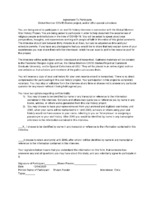
Chris Taylor's Digital Archive Project
All documents are uploaded as pdf forms, and the audio clip recordings of the three interviews are sent as mp3s. I have included the waiver for each person I interviewed, as well as both a transcription of the interview and an audio file. I also sent a brief analysis of my thoughts on the three interviews. The interviews share three people's reflections on the influence of COVID-19 within their religious communities, which include Catholic, Jewish and Mormon faiths. The project was done for a class with Patrick Mason at Utah State University. -
Exploring religion during a pandemic
I am a senior-year college student in Missouri and have decided to learn more about religion since Covid has given me an abundance of free time. I currently do not have any religious affiliations, but have recently felt a need to learn more about various religions. I have enrolled in a religious studies course at my college (which is how I learned about this website!) as well as done my own research. Due to the ongoing pandemic, I no longer feel the same sense of community at my college and have begun looking into other groups. I have been trying to find a religious group that aligns with my personal opinions and beliefs. I do not think I would have begun this journey of self-reflection if it were not for Covid. -
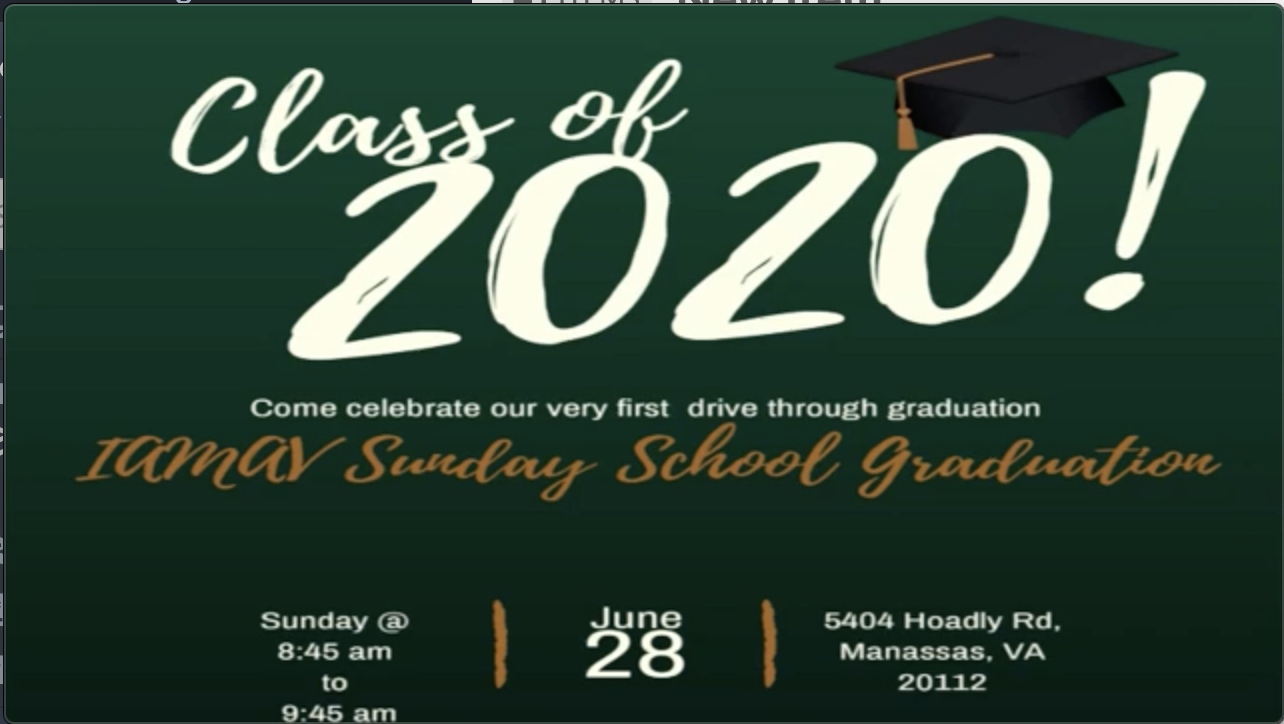
IAMAV Drive-Thru Graduation Day
Dar Al Noor celebrated its 2020 Sunday School graduates with a Drive-Thru graduation celebration -
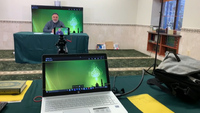
Virtual Programming
This collection of items show how Dar Al Noor shifted their regular programming, such as Sunday school and services, to a virtual format. They also held a virtual fundraiser. -
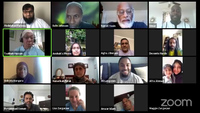
MAV ART Town Hall Meeting
Muslim Association of Virginia's Anti-Racism Taskforce's town hall meeting took place over Zoom -
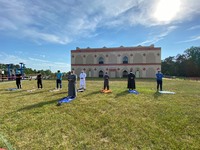
Outdoor Prayers
This collection of images and videos show how Dar Al Noor adapted its services to fit with social distancing guidelines -
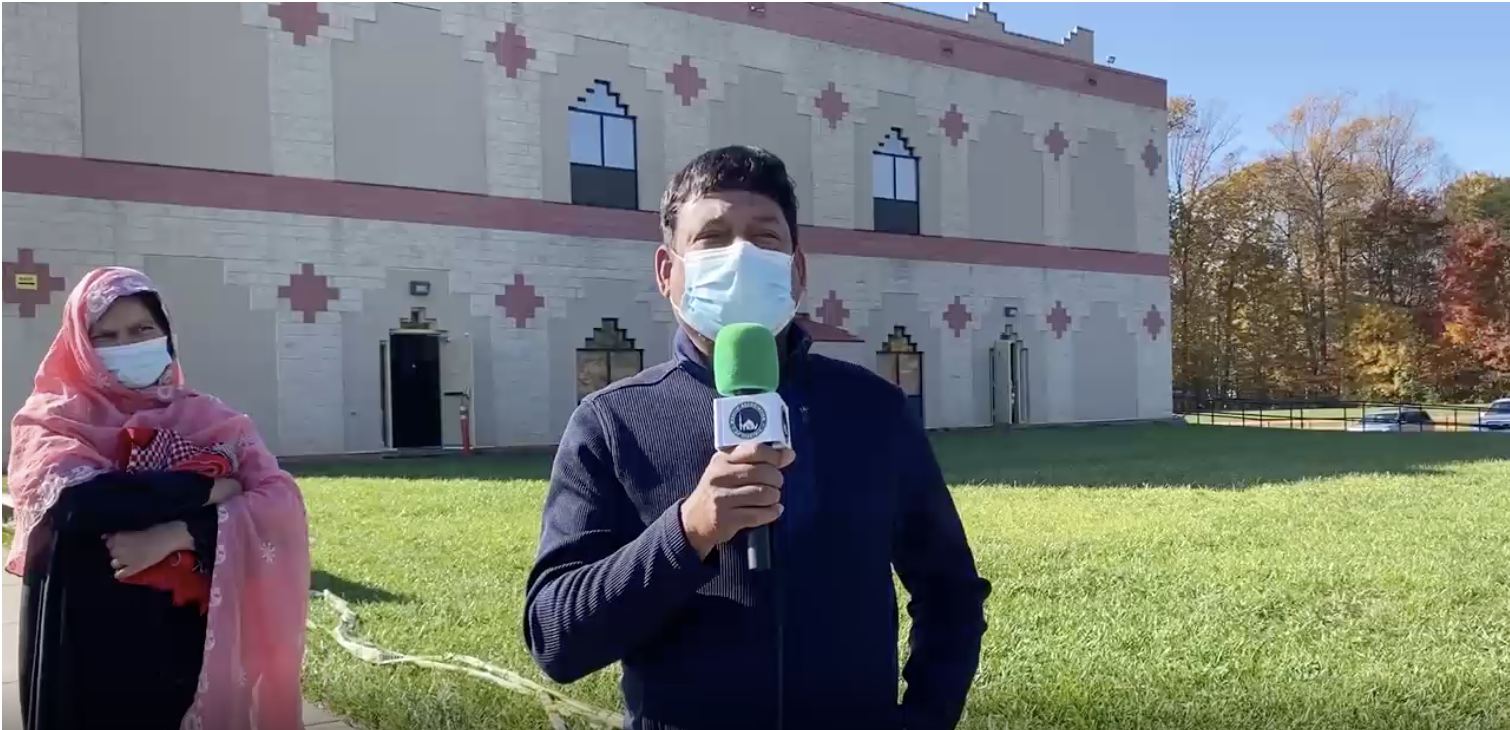
Interviews of Congregants
Dar Al Noor interviewed several of its congregants to talk about the ways the COVID-19 pandemic has affected them and their religious life -
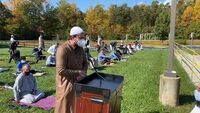
Jummah
Dar Al Noor adapted their Jummah to fit with social distancing guidelines -

Food Distribution
These images show how Dar Al Noor came together to distribute food to their community, such as their bi-weekly food distribution and hot meals during Ramadan -
Finding Faith in a Family Room
I was sitting in my English class on March 12th when my friend walked in and said "Did you hear?" "Hear what?," I said. I soon found out that our church meetings had been cancelled worldwide until further notice because of COVID-19. We were shocked. Up until that point, the news of this foreign virus had seemed irrelevant to us. It did not affect us in any way because "It couldn't spread THAT much, could it?" In no way had it affected our lives up until then. Little did we know that the next day, we would receive word that school was cancelled for two weeks, then two more after that, and eventually, would move online for the rest of the school year. Little did we know that this virus would become a worldwide pandemic lasting up until December, and who knows how long beyond that, deadly in nature. My worship services, a huge part of my life and which I attended each week without fail, were greatly changed as a result of the coronavirus. Thankfully, we had been prepared for this. Over the past few years, the prophets and apostles of our church have re-emphasized the importance of building healthy habits of daily scripture study, prayer, and many other things along with strengthening a personal relationship with God. They had created a new and improved system to help you serve those around you, and encouraged everyone to check up on those assigned to them often. Finally, they had cut down the amount of time spent at church buildings each Sunday in order to place the focus more fully on the sacrament, where we remember Christ's sacrifice and renew our promises to him. As a result of these adjustments, among others, when meetings were cancelled, it made worshipping at home a much more comfortable change. If followed earlier, all of these habits were already implemented in your life. Priesthood holders were able to perform the ordinance of the sacrament at home. In my home, this was a very special experience. Each Sunday, we would all get ready and dressed in our Sunday best, and meet in the family room. We would sit on the couch and the bread and water would be set on a plate on the ottoman by the fireplace. We would sing, pray, and enjoy each others company. I felt that by being able to worship at home, with just my family, I was able to see things with a new perspective. I struggled during the first bit of quarantine to understand why everything was happening and what purpose it would serve to help me in my life, but I believe that part of that reason was so that I could strengthen my trust in and relationship with God. By not knowing what would come in the future, I had to believe that God would lead me where I should go, and that things would turn out as they should. I grew closer to Him and my family, and once church returned, I was even more grateful for it than ever before. -
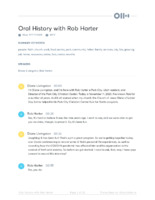
Oral History with Rob Harter
I am a graduate History student at Utah State University taking a course on Religious Special topics with Dr. Patrick Mason. For our final project, we were given the option to gather Oral Histories on religious people and their experiences with COVID-19. Rob Harter graciously agreed to let me interview him. He is the director of a Christian humanitarian center in Park City, Utah. I have included a pdf transcript of the Zoom call along with a link to the 50 minute video/audio interview. There are also a couple of photographs of him and the center. -
The Polish National Catholic Church
Men, women, boys, and girls frantically walk to and fro anxiously getting ready for the day. Mother and son, father and daughter dressed in their finest formal dresses and button-down shirts. As they prepare for their weekly hour renewing the presence of Jesus’s spirit into their souls, they walk to their living room, sit down on the couch, and open up the Facebook live stream on the PNCC. The pandemic has caused unfortunate circumstances to every individual, but for the Polish National Catholic Church community, it continues to make a dire situation worse. Finding a sense of community already proved to be difficult prior to the pandemic and now, being physically apart from each other, the feeling of community has worn down. However, with their devotion to their faith, they have succeeded in adapting to our world’s new normal. The PNCC’s Youtube channel includes all masses since the switch to online service. New services are uploaded at 7:00 am (EST) each Sunday on both their PNCC Liturgies Youtube page and the PNCC Facebook page. Most Rev. Anthony Makovsky, in St. Valentine Polish National Catholic Church located in Scranton, PA, begins the service singing a Christian hymn, which prior was sung by select members of the Church. Even towards the beginning of Mass, the consequences of coronavirus can be felt. The singing of hymns is usually one of the aspects that makes the parishioners feel united, so not doing it together harms their sense of community. Another part of Mass that was drastically changed was the sacrament of Eucharist. This specific sacrament plays a crucial role in PNCC worship, as the service is centered around it. During regular service, individual parishioners partake of a wafer (the body of Christ) and drink wine from a common cup (the blood of Christ). This ritual recreates Jesus's Last Supper and re-presents Jesus's death and resurrection to the gathered group of worshipers. Since online attendees cannot partake of the bread and the wine offered by the priest, a prayer is recited in place of this ritual act. The prayer’s words speak about hoping for Jesus to enter their bodies spiritually. For the relatively few parishes of the PNCC that decided to maintain in-person services, such as St. Valentine’s Church in Northampton, Massachusetts, health and safety precautions were enacted to limit the spread of the virus. Masks are mandatory for members attending the service, but the Celebrant and other ministers do not wear masks to keep the service “natural”. Because of this, they stand apart from other people as much as possible. The pews are regularly disinfected, and loose objects such as the bibles and the holy water at the front of the church are removed to limit contact. First Communion is still held, but the minister enacting the ceremony is required to wear a mask, and audiences are reduced to only the person receiving or giving communion and parents. Prior to the pandemic, the PNCC struggled with the falling membership numbers. This decline has been steady since the 1960s. It may be that the PNCC will see lower attendance in a post-pandemic world. Only time will tell. Although many major seasons of the liturgical year were held online, including Lent and Easter, hope remains for the upcoming Advent season to be held together in-person, as a united front. One of the biggest occasions for the Christian faith is the celebration of Jesus’s birth which is usually celebrated with family and friends. Food, laughter, joy, and sounds of Christmas hymns surround the Church for the four Sundays of Advent. With the pandemic, it might be difficult to celebrate amongst each other. However, the PNCC has stood and overcome tough times before because of their devotion to the community that they built. As the Prime Bishop, Rev. Anthony Makovsky emphasizes during his online homily on October 18, 2020, “Family is everything. We can find family and community with each other”. Because of the Polish National Catholic Church’s resilience and hope for the future and each other, they have a chance of adjusting to our world’s new normal. -
My Prayer Growth During Covid-19
When the coronavirus first began I had a lot of questions, as to why is this happening and now? But we are many months into this pandemic and I realized earlier on that I would need to create some habits that would allow me to bring peace of mind to myself and help with anxiousness. I had come across an article from Oprah Magazine when coronavirus began and it discussed how faith is helping people get through this pandemic. I had not been active in my faith, as much as I had wanted to be when Covid-19 first began, but I can happily say now that my faith has allowed me to feel more grounded in these times. I attended a few virtual masses but the most important part of my faith that kept me grounded was prayer. Through prayer I felt more of an ease at mind thinking about coronavirus. There is a lot of confusion in the world as to why did this happen, why would God do this? But through prayer I felt connected and less anxious about the pandemic. I prayed that people are doing okay and finding their way amongst this pandemic, and I pray for the families who have lost loved ones, but I am hopeful there are many good things that will come from this year. One thing I am very grateful for is the amount of time I have got to spend with family members and with myself. I have had time that I have never gotten before to take tasks slower, enjoy more conversations with the people you love and dive into more hobbies you have never gotten around to. I would have not had this time if I did not go home once the coronavirus just began. Being at home and surrounded by family has allowed me to create many new memories I will cherish. Through this pandemic, prayer has been my rock. I pray many times each day for the world to heal, for grieving families to feel loved in these times of heartache, and for everyone's happiness. Because I believe through this all, it will get better. -
Christian Science Worship During COVID-19
A link to a website describing the changes the Christian Science community has made to its worship and congregations during the COVID-19 pandemic. -
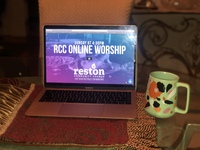
Reston Community Church Online Worship
The pandemic has been extremely stressful for myself and many others but something that I've found that relieves my stress is attending my church's services on Sundays. Even though it is not the same as an in-person experience, it is still nice to attend and keep connected to God and my community! -
College Church in Northampton, MA
Two students sat in a room. It wasn’t just any room, though. It was an online Zoom personal meeting room. Soon after, a third participant appeared, a pastor. Pastor Bill Hodgeman of College Church, a non-denominational church with evangelical roots in Northampton, Massachusetts, was there to converse with and explain to us, the students, how the church is adapting to the current global pandemic. Social isolation is central to staying safe in the pandemic, but the pastor told us all about how the community provided at a church is so central to so many people, especially during times like this. College Church has always been dedicated to bringing people together, and through many initiatives, programs, and planning, they are continuing to foster their sense of community despite the difficulty. During the pandemic, there are numerous interactions that would normally take place that no longer do. In our interview with him, the pastor reminisced about the little things– bumping into someone in the Fellowship Hall, sharing a coffee, or lingering in the parking lot after worship to chat. In addition to these smaller interactions, the deeper ties between members of the church have become harder to maintain. College Church has a program that the pastor refers to as one of the “heartbeats” of the church: small groups of about 8 to 30 people. In these groups, people share meals, discuss scripture, and find their place in the community. Although some have continued to gather outdoors, many have not. Community is absolutely central to College Church, and as can be seen through how they have adapted to the difficult circumstances, they have been putting in a lot of effort to maintain it. The pastor mentioned how one of the first statements by God in the book of Genesis is that it was not good for the man to be alone. At the same time, College Church is dedicated to keeping every person safe. It’s a difficult balancing act, but one they have put a lot of thought and effort into. In their commitment to safety, College Church immediately closed its church office in response to the COVID-19 pandemic, stopping all gatherings, moving leadership meetings online, shifting to online services, and re-purposing its custodial staff. In the spring of 2020, the church pulled together a task force to plan accordingly and put ideas into action. Because the church is an independent church, leadership took cues from Massachusetts Governor Charlie Baker, Northampton Mayor David Narkewicz, and the Centers for Disease Control and Prevention. College Church also consulted medical professionals, community leaders, and project managers to develop a plan that would be compliant with local and state guidelines. The church shifted to online services and later, socially distanced outdoor services. Of course online and socially distanced services were not all the church needed to do. They needed to maintain the community they had before the pandemic and keep anyone from being left behind. Just before interviewing Pastor Bill Hodgeman, he sent us a document that outlined the church’s pandemic response. To say the least, it was extensive. There were 40 different bullet points, each outlining a unique idea, initiative, or program. Patio gatherings to keep people connected, care packages for families with children and the vulnerable, creating online gatherings for the small 8 to 30 person groups, a campaign for a “Gentle Answer” in these polarizing times, promoting radical generosity, and numerous supports for wider community organizations like nursing homes, children’s and educational organizations, and social services are among the examples. Through planning, care, and creativity, College Church has created a space and community to help its members through these isolating times. The key to balancing the difficult act that the church has employed is physical distance, but not social distance. Utilization of technology and community networks have proven to be the most important aspects of surviving this, and creativity has been necessary. Going forward, the pastor said the church will be more creative after this experience. He believes that, across America, technology is heavily underutilized in churches. College Church plans on continuing its online services even after the pandemic to be able to reach a larger audience. The church continues to allocate resources towards the community and has adapted unique methods to unify its members. Although the events of 2020 have brought on hardship for religious institutions like College Church, the creativity incited will create lasting changes that can promote the community atmosphere the church is so dedicated to. -
Holiness in a Parking Lot
Even before the pandemic, I myself was not particularly religiously active, but my grandmother is a devout Catholic. She lives in Illinois, not far from St. Louis, and usually attends mass in this beautiful Czech cathedral, St. John Nepomuk, in the city. It is an old church with an old community, and I have been with her and my family many times. Much of my grandma's socialization is with her church friends, whether it is on site for events or outside of the church setting. Because of the pandemic, she has been attending mass at a smaller church in her own town. When things were normal, she would go there sometimes, like on Easter if she didn't have the time to drive to St. Louis and back, but she much preferred her usual routine. Over the course of the pandemic, I've kept up with my grandma, and she has told me about her experience through these times at this smaller church. At first, I believe they were having socially distanced, masked, outdoor masses through the summer, but as it got cold, they transitioned to having churchgoers sit in their cars and watch the priest, who would remain alone under a tent. Eventually the priest went back inside as the church allowed more people to come in while following guidelines. My grandma is particularly cautious, so she chose to remain in her car during these masses. She told me that there is a video (maybe just audio, I can't remember) from within the church that is played outside to allow those uncomfortable with entering the building to maintain some connection with the priest. My grandmother is 82, so she is obviously at some risk from the virus. Because of this, the cautions she has had to take and sacrifices she has had to make have changed her life drastically. She hasn't been able to see family or friends much (some, while being safe), and that includes much of her church community, where I know she really feels at home. She is a tough woman, so I know that she is going to make it through this awful time, but her religious experience, as well as many other aspects of life, has been affected a great deal. -
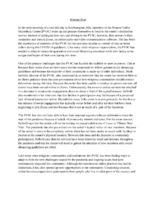
Worship During the Pandemic at the Pioneer Valley Shambhala Center
Description of worship during the pandemic at the Pioneer Valley Shambhala Center including a screenshot of a letter from their director to the community -
How COVID-19 and death has reshaped my religious practices
I have always practiced my religion but I started to do it less as I have gotten older. When I was younger, I would go to church every Sunday however as I've aged, I do not go as much but I make sure to pray before I go to sleep every night. However, my religious practices changed once the pandemic hit and I had a death in my immediate family. Dealing with grief after losing a loved one is something that I have never experience before and it caused me an immense deal of pain (and still does). But, I've found that because of this, I have started to pray more and attend church a lot more frequently which has helped with dealing with the pain that I feel. My family and I even donated to a COVID-19 relief fund! -
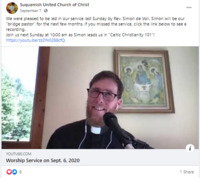
Suquamish United Christ of Christ September Facebook Posts/Updates
Posts made during the month of September to the Facebook page of Suquamish United Church of Christ -
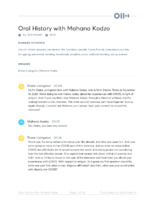
Oral History with Mahana Kodzo
I am a graduate student at Utah State University. For a final project, I was given the option to record an Oral History for a religious person. I chose Mahana Kodzo from Ghana. Included in this record is an audio recording, a pdf transcript of the interview, and a couple of photographs of her and her children. I have a consent form on file from her to allow me to publish this record with you. -
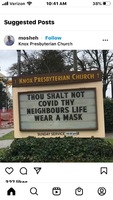
Knox Presbyterian Church Sign
This screenshot from Instagram shows a picture of Knox Presbyterian Church's sign, which reads, "Thou shalt not COVID thy neighbors life. Wear a mask." -
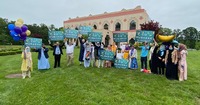
Eid Celebration
This video and image from the Dar Al Noor Islamic Community Center show how they were able to adapt their celebration of Eid to the COVID-19 pandemic. -
Recording conversations with my father, a Presbyterian minister
My 95-year-old father, a Presbyterian minister and also a mission worker in the Philippines during the 1950s and 60s, is living under lockdown in a senior residence in Philadelphia. To ease his isolation, last summer I began recording conversations between him and his children. His mind is still sharp, his passions are strong, and his imagination just keeps expanding, perhaps more so because of his confinement in a two-room apartment. The conversations touch on many topics including the roots of his commitment to justice issues, Presbyterianism, his love for his family, and his views of the afterlife. To share these marvelous conversations, I created (with my father's consent) a podcast called Keeping Dad Alive. You can listen on your favorite podcast app and on the web at https://keepingdadalive.com/. -
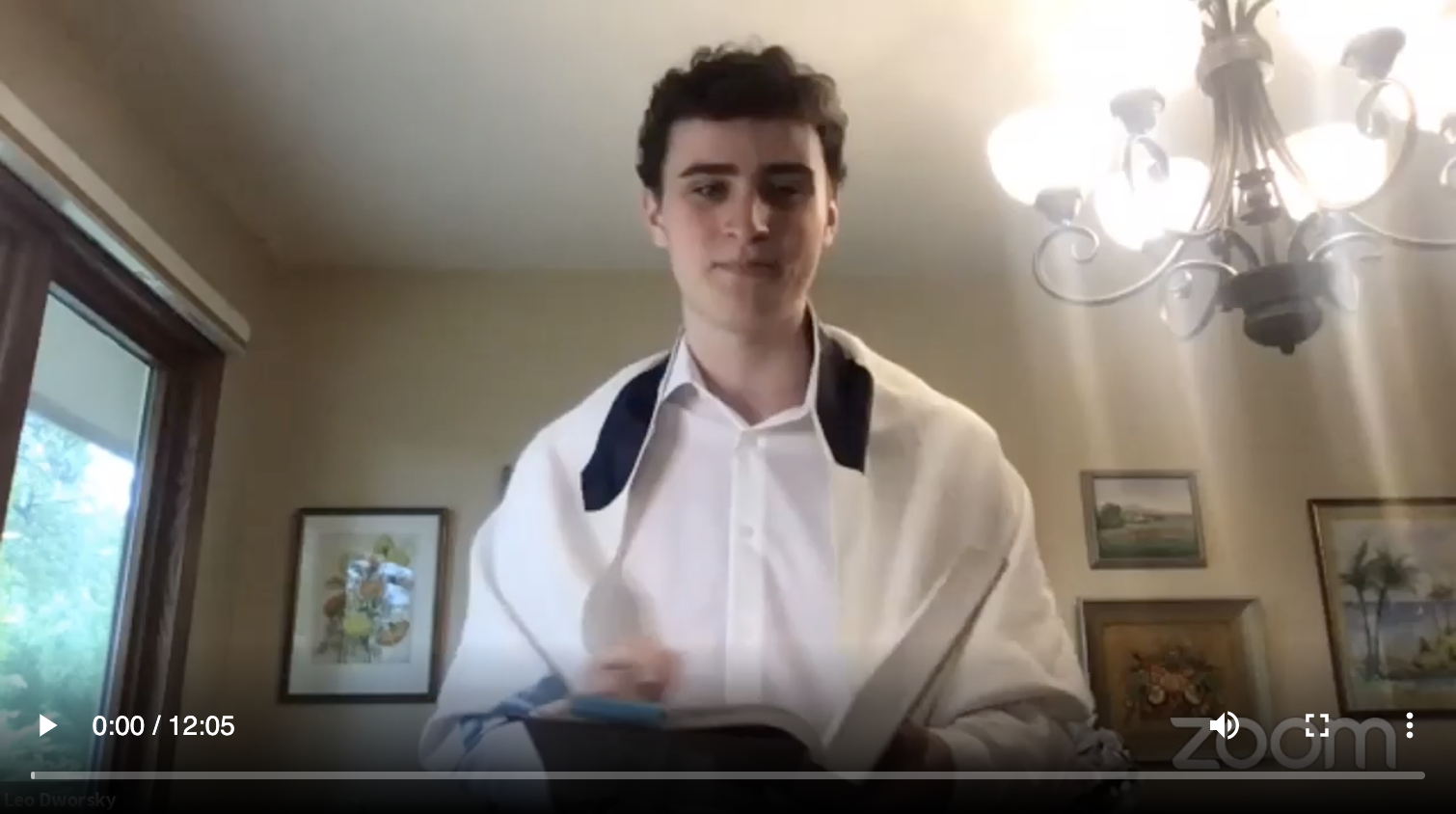
Sermon from Rabbi Olitzky - Ivri: Traditional Service - Rosh Hashanah Day 1
Rosh Hashanah Virtual Sermon